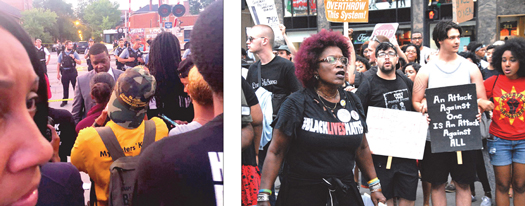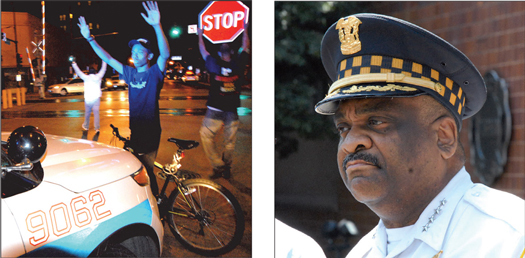Police public relations isn’t transparency and won’t end the policing crisis
By Final Call News | Last updated: Jul 18, 2018 - 9:06:49 AMWhat's your opinion on this article?

(L) Residents and activists take to streets of South Shore community after July 14 shooting of 37-year-old Black barber. Photo: Twitter@B4P_100 (R) Woman during 2016 protest of police killing of Paul O’Neal in the South Shore neighborhood of Chicago where another Black man was shot to death by police July 14. Photos: Haroon Rajaee
|
A freeze frame video released by police showed Harith Augustus confronted by officers and that he was apparently armed in a city that allows for legal carrying of concealed weapons. The video also shows the 37 year old Black barber breaking away from officers in the South Shore community in Chicago. Officials say the video shows a weapon and the man going for his weapon while running away—prompting a rookie officer to draw his service weapon and fire fatal shots.
While the police chief released the video within 24 hours of the July 14 shooting in the name of transparency, what he really did was make a public relations move. Transparency is not releasing a video that you believe exonerates your officers, it is allowing the public that pays your salary the opportunity to review the good, the bad and the ugly of the police department. That kind of transparency and holding officers accountable for wrongdoing builds confidence in law enforcement and opens the door for a better and healthier relationship.
There are also questions about the video: does it show the full story? Where is the unedited version with sound? Where is the footage from the other officers who were on the scene?
Police have said the victim could legally carry a weapon but did not have a concealed weapons permit. They also said he tried to pull a weapon on officers, but not everyone agrees that’s what the stunning video shows.
Prior to the video release, angry South Side residents clashed with cops and marched to a police station showing their disgust and their pain. Chicago Superintendent Eddie Johnson hoped the video would bring calm but it will take much more than that.
The Chicago Police Dept. is seen largely as an occupying force in Black neighborhoods, not heroes who serve and protect a community bedeviled by crime and real problems.

Protestors stop police car during one of many anti-police violence demonstrations in the city in recent years. (R) Chicago Police Supt. Eddie Johnson
|
Blacks in these neighborhoods often have to choose between being victimized by criminals or being victimized by cops. Sometimes, as one longtime Chicago activist noted, law-abiding folk are abused by law breakers and so-called peacekeepers.
Video and platitudes aren’t going to solve the problem, doing justice over time will. The police chief, most recently in the case of a cop who killed a young man and an innocent bystander, has shown he is loath to discipline his force. The agency that is supposed to oversee the police force called for the cop’s firing, the police superintendent overruled the body and kept the cop. The same cop was charged with assault and got off but a short time later was accused in another fight. A high school student who goes to the principal’s office three times faces expulsion, but a cop who shoots and kills two people, gets in a public fight and then another fight is retained?
This is indicative of the problem: no accountability and the tacit, if not, outright declaration that Black people cannot be policed unless officers have the unchecked and unquestioned right to be abusive. These antics and political failures to rein in departments are bringing the country closer and closer to an explosion and helping cities into financial ruin. “As the costs of police misconduct rise, cities and counties across the United States are going into debt to pay for it. Often this debt is in the form of bond borrowing. When cities or counties issue bonds to pay these costs, banks and other firms collect fees for the services they provide, and investors collect interest. The use of bonds to pay for settlements and judgments greatly increases the burden of policing costs on taxpayers, while producing a profit for banks and investors. Using bonds to pay for settlements or judgments can nearly double the costs of the original settlement. All of this is paid for by taxpayers,” observed the Action Center on Race & the Economy, in a recent report, “Police Brutality Bonds.” “Police violence and misconduct cases are on the rise throughout cities across the United States wreaking havoc particularly on communities of color, causing debt, and leaving taxpayers to pick up the tab while banks and investors profit,” said the report authors. “These police brutality bonds quite literally allow banks and wealthy investors to profit from police violence. This is a transfer of wealth from communities—especially over-policed communities of color—to Wall Street and wealthy investors, and it needs to stop.”
Police officers, who almost never, never, ever, never bear any personal financial responsibility when their misconduct results in payouts of millions of dollars, keep their jobs and pensions. But cities cry broke and fail to invest and develop the very neighborhoods where the brutality takes place. So Black neighborhoods are stripped, services canceled or curbed, schools closed, and these abandoned, desolate communities stay in cycles of crime and socially engineered destruction used to justify abusive policing.
That’s not counting the social and spiritual cost of living in a war zone and the psychological toll such living hell takes on the souls of Black folk. It’s an ugly and deadly shell game and offering a video or holding a community-police baseball game, picnic or basketball tournament won’t solve that.
The answer is a simple thing: Do justice. And, if the police force won’t do justice, then the people must hold those who hire and fire top police brass accountable. Such unity must mean a commitment to staying vigilant and pursuing power for our people not being consumed with watching Power and rapper 50 Cent on television. We must unite, we must organize and we must act—our lives depend on it.
INSIDE STORIES AND REVIEWS
-
-
About Harriett ... and the Negro Hollywood Road Show
By Rabiah Muhammad, Guest Columnist » Full Story -
Skepticism greets Jay-Z, NFL talk of inspiring change
By Bryan 18X Crawford and Richard B. Muhammad The Final Call Newspaper @TheFinalCall » Full Story -
The painful problem of Black girls and suicide
By Charlene Muhammad -National Correspondent- » Full Story -
Exploitation of Innocence - Report: Perceptions, policies hurting Black girls
By Charlene Muhammad -National Correspondent- » Full Story -
Big Ballin: Big ideas fuel a father’s Big Baller Brand and brash business sense
By Bryan Crawford -Contributing Writer- » Full Story






 Click Here Stay Connected!
Click Here Stay Connected!








